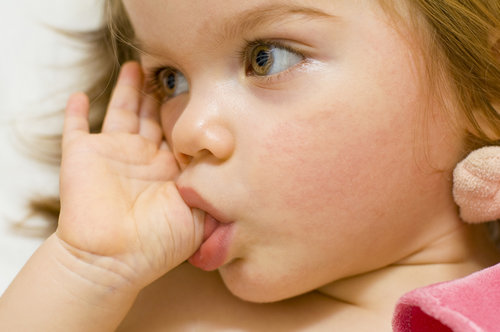If you are worried about your child’s thumbsucking habits, call Drs. James and Samuel Owens at 918.455.7700. If your child continues to thumb suck after the permanent teeth have come in, it can cause problems with tooth alignment and your child’s bite. It’s best to nip this habit in the bud early one to prevent orthodontic issues later. The risks of continuing to suck the thumb clearly outweigh the benefits!
Thumbsucking emerges in infancy, but the habit may start even earlier. Many babies have been sucking already for multiple months before they even leave the womb. By the time they have grown to age 3 or 4 when it’s time to stop the habit, kids’ thumbs travel a well-worn path to their mouth, a pathway so familiar that most ardent thumbsuckers aren’t even aware when or if their thumb is in their mouth.
Sucking is a natural reflex and infants and young children may suck on thumbs, fingers, pacifiers and other objects. It may help them relax or make them feel safe or happy. Most children stop sucking by age 4. The frequency, duration, and intensity of a habit will determine whether or not dental problems may result. Children who rest their thumbs passively in their mouths are less likely to have difficulty than those who vigorously suck their thumbs.
HOW CAN THUMBSUCKING AFFECT MY CHILD’S TEETH?
After permanent teeth come in, sucking may cause problems with the proper growth of the mouth and alignment of the teeth. It can also cause changes in the roof of the mouth.
Pacifiers can affect the teeth essentially the same ways as sucking fingers and thumbs, but it is often an easier habit to break.
The intensity of the sucking is a factor that determines whether or not dental problems may result. If children rest their thumbs passively in their mouths, they are less likely to have difficulty than those who vigorously suck their thumbs. Some aggressive thumbsuckers may develop problems with their baby (primary) teeth.
WHEN DO CHILDREN STOP SUCKING THEIR THUMBS?
Children usually stop sucking between the ages of two and four years old, or by the time the permanent front teeth are ready to erupt. If you notice changes in your child’s primary teeth or are concerned about your child’s thumbsucking consult your dentist.
HOW CAN I HELP MY CHILD STOP THUMBSUCKING?
- Praise your child for not sucking.
- Children often suck their thumbs when feeling insecure or needing comfort. Focus on correcting the cause of the anxiety and provide comfort to your child.
- For an older child, involve him or her in choosing the method of stopping.
- Your dentist can offer encouragement to your child and explain what could happen to their teeth if they do not stop sucking.
- Find a relatable story to read to your child about another kid who overcame thumbsucking as David Decides About Thumbsucking, a story for children with an information section for parents. This book was inspired by a Mom who was dealing with a thumbsucking child. Reading the book motivates children to want to end thumbsucking habits, and shows them how to succeed.
- Remind the child of their habit by bandaging the thumb or putting a sock on the hand at night.
If these tips don’t work, your dentist could prescribe a bitter medication to coat the thumb or a mouth appliance that could help.
It’s generally not until they become toddlers that the downsides of thumbsucking begin to outweigh the gains. Kids then tend to suck when they are trying to fall asleep when they feel bored when they are idling between activities, and to self-soothe when they are upset. While these continue to be positive motivations, the facial appearance detriments of continuing to suck make it important that children by this age find other solutions to these natural challenges. Good luck!


Recent Comments